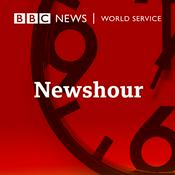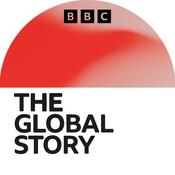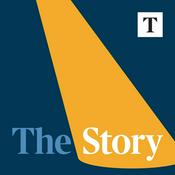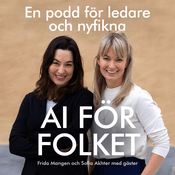Global Dispatches -- World News That Matters
Global Dispatches

Senaste avsnittet
1123 avsnitt
- Donald Trump doesn't much like Pedro Sánchez — and the Spanish prime minister is perfectly fine with that. Unlike other European leaders who reflexively genuflect to the American president, Pedro Sánchez stands apart for his willingness to confront Trump—not for its own sake, but in service of a theory of politics that diverges sharply from many of his European counterparts. As my guest, journalist Dave Keating, puts it: "While other European leaders zig, Pedro Sánchez zags."
Most recently, Sánchez enacted policies to regularize the immigration status of roughly 500,000 undocumented migrants living in Spain, granting work permits and other pathways to formally enter Spanish society and the economy. He has also resisted efforts to substantially increase defense spending, while boosting Spain's support for international development and foreign aid.
In today's interview, we discuss Pedro Sánchez's unique standing in European politics, why he's sometimes shunned by other leaders in Brussels, and whether his experiment in regularizing half a million undocumented migrants can actually succeed.
Dave Keating is the Brussels correspondent for France 24, writes the Gulf Stream Blues Substack, and is the author of the new book The Owned Continent: How to Free Europe from American Military, Economic, and Cultural Dependence. The Secretary General Race Heats Up — And the Epstein Files Hit the UN | To Save Us From Hell
2026-2-09 | 18 min.For the first time in history, multiple countries have jointly nominated a candidate for UN Secretary General. Earlier this week, Brazil, Chile, and Mexico endorsed Michelle Bachelet—a former president of Chile, former UN High Commissioner for Human Rights, and a survivor of brutal repression under the Pinochet regime. The move is unprecedented—and potentially transformative. What does it signal about the race to replace António Guterres, and how soon might more rival candidates emerge?
Anjali and Mark unpack what this coordinated nomination reveals about shifting power dynamics inside the UN. They then turn to the latest Epstein document dump, which has ensnared several prominent diplomats and sent shockwaves through the diplomatic world. Finally, they confront a looming institutional crisis: the UN's cash reserves are so depleted that even the viability of this year's UNGA is now being called into question.
Get the full episode by purchasing a subscription at this discounted price.
https://www.globaldispatches.org/40PercentOff- The Chicago Council on Global Affairs has been tracking American views on foreign policy since the end of the Vietnam War. Last week, it released its 2025 survey—and the results point to a widening partisan divide on some of the most fundamental questions about America's role in the world.
That was not always the case. For most of the past 50 years, Democrats, Republicans, and independents largely agreed on the proper role of the United States in the world. There were always differences, of course, but they tended to exist at the margins. On big-picture questions—such as alliances and working cooperatively with other countries—there was broad consensus. That consensus began to shift in 2015 with Donald Trump's entry into the American political scene. Now, ten years later, this latest survey shows partisan divides that are deeper than ever. America's domestic polarization has finally caught up with its foreign policy.
To discuss these survey results, I'm joined by Jordan Tama, a professor at American University in Washington, DC, who specializes in the intersection of American public opinion and foreign policy. We begin by discussing the historical sources of bipartisan foreign policy consensus, before turning to a longer conversation about how and why that consensus has fractured—and what this shift suggests about the future of American foreign policy.
Discount code: https://www.globaldispatches.org/subscribe?coupon=124f4694 - For the past year and a half, South Sudan has been on the brink of a new civil war. A 2018 peace deal that ended the last civil war has been faltering, while the war across the border in Sudan has threatened to spill south.
According to my interview guest, Daniel Akech of the International Crisis Group, the tipping point has been breached. We are now in the early stages of a new civil war in South Sudan—one that may prove even more destructive than the 2013–2018 conflict, which left an estimated 400,000 people dead.
There are a number of reasons for this—not least the civil war in Sudan, which has decimated oil revenues that long underpinned South Sudan's political economy. And, as in the first civil war, ethnic tensions are being deliberately stoked, raising the prospect of mass atrocities.
We kick off by discussing recent events on the ground in South Sudan, including an offensive by opposition forces sparked by the arrest and prosecution of Riek Machar, a former vice president who led one side of the previous civil war. We then explore the potential trajectory of this conflict, how it is intimately tied to the war in Sudan, and the role of key regional actors.
South Sudan is a new country, having gained independence from Sudan in 2011—but just two years later, civil war erupted, killing hundreds of thousands, displacing millions, and destroying infrastructure across the country. This new outbreak of violence may lead to something just as bad— or worse — but has received little attention in the Western press. - One year ago, the United States was winning the global fight against HIV/AIDS. Thanks largely to American leadership, infections and deaths from HIV/AIDS have dropped precipitously over the past 20 years, ever since the U.S. government made combating the disease a global priority. Some once–hard-hit countries in sub-Saharan Africa were even on track to become AIDS-free by 2030.
But then, suddenly and without warning, Donald Trump issued an executive order on January 24, 2025 that all but ended U.S. funding for global HIV/AIDS relief. One year on, people have lost access to treatment, and the specter of a resurgence of HIV/AIDS—after years of steady decline—now looms. Meanwhile, the Trump administration is cutting bilateral deals with countries like Zambia, releasing health and development assistance in exchange for access to natural resources and mining concessions.
Joining me from rural Zambia is journalist Andrew Green, who is in the midst of a reporting project documenting the impact of these cuts on HIV/AIDS prevention efforts around the world. We kick off by discussing the historic role the United States played in the fight against HIV/AIDS before turning to what has been lost—and how countries across sub-Saharan Africa are responding.
Fler podcasts i Nyheter
Trendiga poddar i Nyheter
Om Global Dispatches -- World News That Matters
The longest running independent international affairs podcast features in-depth interviews with policymakers, journalists and experts around the world who discuss global news, international relations, global development and key trends driving world affairs.
Named by The Guardian as "a podcast to make you smarter," Global Dispatches is a podcast for people who crave a deeper understanding of international news.
Podcast-webbplatsLyssna på Global Dispatches -- World News That Matters, Berglund Allard och många andra poddar från världens alla hörn med radio.se-appen

Hämta den kostnadsfria radio.se-appen
- Bokmärk stationer och podcasts
- Strömma via Wi-Fi eller Bluetooth
- Stödjer Carplay & Android Auto
- Många andra appfunktioner
Hämta den kostnadsfria radio.se-appen
- Bokmärk stationer och podcasts
- Strömma via Wi-Fi eller Bluetooth
- Stödjer Carplay & Android Auto
- Många andra appfunktioner


Global Dispatches -- World News That Matters
Skanna koden,
ladda ner appen,
börja lyssna.
ladda ner appen,
börja lyssna.





























